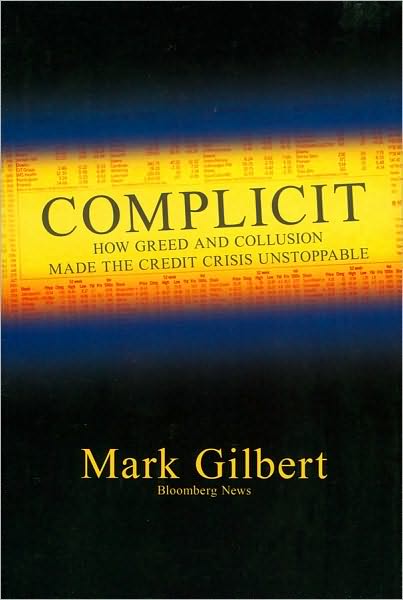I am not sure how many current economic crisis books I have reviewed.? I think I am getting close to a dozen and I am currently reading “Fault Lines.”? I’m not sure I want to do many more crisis book reviews.? Tonight’s review is Complicit, by Mark Gilbert of Bloomberg.
Bloomberg columnists are typically good writers, with detailed knowledge of their subject areas, and a no-nonsense approach to writing.? This book from Mark Gilbert is no different.? As Joe Friday often said, “All we want are the facts, ma’am.”
And for the most part, that’s what you get in Complicit.? It is not a long book at 173 pages, but it comprehensively chronicles the growth in leverage, and how it spread to many areas of the investment markets.
When bubbles grow, everyone is a friend.? Underwriting becomes lax, limits are stretchable, FICO scores are pessimistic approximations, etc.? Risk is transitory; we originate to sell.? Regulators don’t want to stand in the way of seeming prosperity.? Nor do politicians.
Leverage gets higher in explicit and implicit ways.? Credit spreads get tight as a drum.? It is a virtuous cycle… until it become a vicious cycle.
In the bust, credit spreads rise, cutting off the possibility of refinancing.? Then asset defaults come, and GSE and bank insolvencies.
Central banks did not view inflation broadly enough, focusing on goods price inflation, and ignoring the asset inflation that was distorting the economy.? They disclaimed an ability to see, much less deal with bubbles.
The high yield market became a frenzy for yield, with CDO equity bidding for lousy bonds and default protection on lousy corporations.? Debt spreads tightened to levels that indicated perfection had arrived.
Investors chased risk, seeking returns.? There were too many parties willing to make fixed commitments, because they needed to earn a lot.? Balance sheets were ignored, and income statements were everything.? History being bunk, was thrown out the window, because it was different this time, we were in a new era.
The crash in Shanghai was the first warning in February 2007, followed by the equity quant crisis in August 2007, and the breakdown in the money markets.? All of the clever ways parties used to lever up short-term credit blew up, forcing banks to take credit back onto their balance sheets.? At that point, everyone should have dumped the banks, but few did; leverage was too high, and asset prices were falling.
The critical decision was bailing out Bear Stearns.? I agree with Gilbert; either both Lehman and Bear should have been bailed out or neither.? I think not bailing Bear and Lehman out would have led to the best outcome.? After Bear failed, other banks would have moved to straighten themselves out.? We might not have had as much failure had as we eventually did. The inconsistency of regulation, as well as the unwillingness or regulators to be tough added to the crisis.
The book covers the September 2008 climax well, but takes us past that, offering possible solutions.? I particularly liked the ideas of limiting the number of academics in important regulatory posts, and having more regulators with practical experience.? I also liked central bankers being proactive on bubbles, and the asset/liability matching inherent in paying those that make long term decisions with financial instruments that last for the term of the decision, and are contingent on the credit quality of that decision.? An example would be paying securitization originators with pieces of the subordinated tranches.
I liked the book; for those with limited time, the book is particularly suitable, because it is brief.
Quibbles
Gilbert’s style is hard-hitting; though many financial companies took advantage of government largesse, few practically considered the possibility of bailouts while the boom was going on; they were pursuing profit with little thought of systemic risk. There was a lot of greed, but in my opinion, few expected bailouts, but took them when they were offered.
Who would benefit from this book?
Most people would benefit from this book on the crisis.? The book is available here: Complicit: How Greed and Collusion Made the Credit Crisis Unstoppable (Bloomberg)
Full disclosure: The publishers sent me copies of these books, hoping that I would review them.? I review about 80% of the books that get sent to me.
If you enter Amazon through my site, and you buy anything, I get a small commission.? This is my main source of blog revenue.? I prefer this to a ?tip jar? because I want you to get something you want, rather than merely giving me a tip.? Book reviews take time, particularly with the reading, which most book reviewers don?t do in full, and I typically do. (When I don?t, I mention that I scanned the book.? Also, I never use the data that the PR flacks send out.)
Most people buying at Amazon do not enter via a referring website.? Thus Amazon builds an extra 1-3% into the prices to all buyers to compensate for the commissions given to the minority that come through referring sites.? Whether you buy at Amazon directly or enter via my site, your prices don?t change.


2 thoughts on “Book Review: Complicit”
Comments are closed.